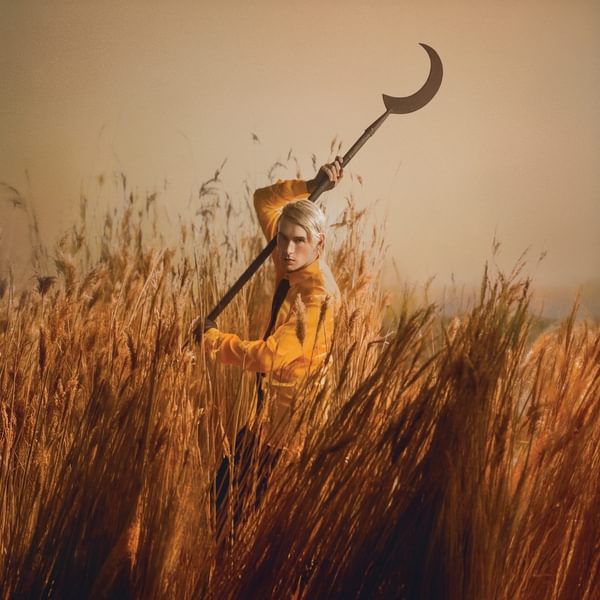
TLOBF Interview // Alex Neilson (Trembling Bells)
I’m not going to rest until Middlesbrough has a similar cultural cache as Memphis! – Alex Neilson
Taken on a grand scale, interest in folk music and folk culture in general might be seen as a series of moments, moments in which the urge to explore our shared heritage prompts a revival, or moments in which a revival is prompted. Who knows whether it’s possible to nail down exactly why these moments occur – maybe it’s at a time of crisis, collective, national (something is rotten, the time is out of joint and the ghosts will walk); maybe it’s driven by some unknowable time cycle operating just out of our vision; maybe it’s just a the bland patterns of fashion – but the moments are there: the early part of the 20th century, the mid 1950s, the late 1960s/early 1970s. And what of our own time? Aside from an argument that there seems to be a blanket access and interest in everything - a kind of targetless nostalgia – there does seem to be a strong, and deep resurgence of explorations in the folk form. If you go looking it seems to go on forever, down to the soil.
Trembling Bells could just be an ornate figurehead for this ragged, disparate collective. Drummer Alex Neilson, who formed the band in the middle part of the the last decade as a vehicle for his interest in songwriting, has a history in free folk and improv and has played with a whole host of scene luminaries from Richard Youngs to Bonnie ‘Prince’ Billy. Simon Shaw and Mike Hastings are folk/psych scene veterans and in Lavinia Blackwall, a student of medieval music and classically trained vocalist, they have the quintessential soaring, vaulting singer – she invests the music with drama and gravity.
I spoke to Alex via email about what has been quite a year for Trembling Bells, and his views on the inherent nostalgia of the folk scene, flowery shirts and ah, Jennifer Rush.
TLOBF: It’s been a busy year for you guys – what’s happening with Trembling Bells at present?
Alex Neilson (hereafter, AN): At the moment Lavinia and I are mainly scoring parts for our next album, which is due to be recorded in mid-October. I initially imagined it to be more live and ‘core band’ orientated than the last one but the list of instrumental personnel is piling high – including an oboist and French horn player, which is a first for me. I am really happy with the way the songs are shaping up and it feels a little more rocking and less ornate than the last one.
We are aiming to record another couple of songs around the same time to be released as a Christmas single. These include us backing Mike Heron on a version of his song ‘Feast of Stephen’ and Bonnie ‘Prince’ Billy singing a new song of ours called ‘New Years Eve’s the Loneliest Night of the Year’.
We have a smattering of festival dates and a short tour due in December which will be a nice way to round off an eventful year which has seen us travel to Brazil, America, Glastonbury, tour with Bonnie ‘Prince’ Billy, release an album etc etc.
TLOBF: Abandoned Love, instrumentation aside, seemed to have overall a tighter, more ‘rock’ feel about it. Was that an intentional thing, or was it born of touring and playing together?
AN: We usually play a few live dates leading up to a recording session to ensure the songs are well drilled. I think we developed more of a musical rapport between our first and second albums and hopefully have done so again before the third. This involves me being slightly less proscriptive in the parts the group are required to play and people being freer to inject their own personalities. This is an ongoing negotiation for me to entrust my little babies to the others but it is getting more egalitarian. The only way I know how to write/conceive the music is to map everything out in my head in quite a detailed way before I present it to the band but hopefully I will learn to loosen my tyrannical grip next time around.
I think also the advent of Mike Hastings on guitar helped enforce more of a rock edge. He sweats Acid guitar solos in his sleep so that, combined with a strengthening musical chemistry and my own growing interest in classic rock, might have informed the direction. This was a conscious development along with trying to invest the song writing with an experimental interest in easy listening and pre-Renaissance music.
TLOBF: You’ve spoken about how Carbeth was an attempt to illuminate places of the UK that had a particularly strong resonance with you, and that the title itself was named after a little-known place on the shores of Loch Lomond. What’s behind that urge to transmute place into words or music?
AN: I had something of an epiphany around the age of 18 when I first came across traditional British folk music. Growing up in Leeds and then discovering The Watersons singing in broad Yorkshire accents about whaling disasters off the coast of Whitby, invested the very landscape around me with a kind of hallucinatory splendour that was romantic, death defying and very real. The elemental power of the unaccompanied voice, eulogising places that I recognised and investing them with heroic proportions was a revelation. I was fascinated by the ease with which American place names were evoked in song titles and lyrics. They seemed to have an automatic credibility and monumentality and I was interested in doing a similar thing with the places in Britain in whose presence my heart had first opened to some realisation or other. There really are some inspirational places on this good, grey isle – places of real beauty and myth – but the culture can feel so uptight and compromised and it can be difficult to reassess them. But I’m not going to rest until Middlesbrough has a similar cultural cache as Memphis!
TLOBF: In White Bicycles Joe Boyd talked about how the British seem unable or unwilling to connect with our musical heritage- preferring to indulge in pantomime or whimsy. He implied that there might be some fear of our past. Do you think there is any truth in that?
AN: It’s difficult to say. There seems to be a combination of many different factors; the legacy of Empire, historical forgetfulness, a problem with image, institutional conservatism inside folk hierarchies, the wholesale importation of American culture, lack of education at junior school level or what Shirley Collins and Austin John Marshal described as the war memorial replacing the maypole at the centre of civic life… I’m not really sure.
There is definitely an element of whimsy/ parlour song/ music hall that streaks through the British cultural mentality and that might have eclipsed a popular interest in folk music around the Second World War. This is a sensibility that I was initially resistant to, but I now enjoy – from Noel Coward to Vivian Stanshall. Musical practise is theatrical and necessarily so. I think there is a real misplaced emphasis on the notion of ‘authenticity’ in Folk and the custodians of that music are protective over a specific and sanitised version of it. Traditional folk music is stigmatised according to popular perception but maybe it doesn’t do itself many favours – it can be very insular, insipid and intolerant.
TLOBF: And what about Trembling Bells? Are you deadly serious about what you do or is there some of that self knowing and whimsy about your sound and image?
AN: Probably like most people, I feel like I have very contradictory aspects of my personality continually vying for presidency. These range from the very cultured and aesthetically refined to the very lowbrow and base. I am a massive fan of football and got a kick out of an excerpt from Eric Cantona’s autobiography; that a pass between Alberto Carlos and Pele in the 1970 world cup is as beautiful as the poetry of Arthur Rimbaud. That sentiment echoes my own feelings pretty well.
As for Trembling Bells, I would say that there is very little self-consciousness and whimsy about what we wear or how we sound. It is not very formally conceived. I have a strong preference for floral shirts because I find them very joyful. My favourite period of art is the Arts and Crafts movement and I am very interested in art that can be enjoyed by people on an uncomplicated level as an integrated part of their daily lives. I also have a keen interest in Early Music but also in trashy rock n roll. I guess TBs is an ongoing experiment in bringing together these opposing obsessions.
TLOBF: I’m not sure if you’ve read Rob Young’s superb Electric Eden, but in that he argues that a good deal of 20th century folk-related music is characterised by a kind of simultaneous nostalgia for a perceived pastoral golden age and a projection of this into a future Utopia. Would you agree with that? Does that have any bearing whatsoever on what Trembling Bells are doing?
AN: I’m actually just reading that book at the moment and have been greatly enjoying it. It’s sheer scope and the quality of the writing is breathtaking. A real achievement and a definitive take on the subject. I would say that it seems like Rob and I share some similar attitudes and interests and I am really inspired by his output. I look to music and culture of the past out of despondency for much of contemporary culture, which I find to be hysterical and generally lacking in substance. I think there is a fathomless wealth of things to learn from and the emphasis on craftsmanship was much greater before. But I think it-was-ever-thus that people would be dissatisfied with their participation in modernity and that some vague golden age is being eroded by a technologically obsessed society.
I am not very politically inclined (ever since the start of the Iraq war), but am a liberal by nature and feel like ‘politics starts at home’, meaning that you can positively affect your zone of influence and try to improve the quality of your own life and that of others around you (your daily reality). This has tangible political implications rather than throwing yourself onto the gears of some terrible and unstoppable machine and submitting your life to something that is unwinnable.
TLOBF: What about the loose ‘scene’ that exists at present around Glasgow and beyond – the likes of yourselves, Alasdair Roberts, Family Elan, Ben Reynolds, Scatter Harrappian Night Recordings etc etc – is this indicative of some wider influence, something other than just happenstance?
AN: I certainly know all these people and have worked with them closely in the past. I think it might have felt like there was more of a scene or community a few years back but I’m not sure if that is necessarily the case now. I have the utmost respect for these guys and there are definitely a lot of mutual enthusiasms, but though sometimes it can feel like the more you have in common with someone then the bigger the discrepancies in your interest can become. I am lucky to count (some of) these people among my good friends and get to see them play regularly.
TLOBF: Could you tell us a bit about your upcoming show at Cecil Sharp House featuring yourselves, Alasdair Roberts and Shirley Collins? What else have you got planned for the future?
AN: We were invited to play that show by some friends of ours in London who do Miles of Smiles promotions. We are going to be joined on stage by Mike Heron to perform his song ‘Feast of Stephen’ and we will also be joined by the female Morris dancing troupe, Belles of London City, on one of our songs. I am looking forward to Shirley’s talk (I think it is her new one about folk song collector Peter Kennedy?) and I think Rob Young might be doing some compeering too, so it should be a cool revue.
Aside from the things I mentioned in the first question, I am due to tour in America with Current 93 next spring and do some recording with them soon. I am recording percussion on a cover of ‘Love Will Tear Us Apart Again’ for a friend’s compilation with Peter Hook, Dave Barbarossa and Marc Almond, which should be good. I’m also contributing a chapter to a new book on the Incredible String Band.
TLOBF: Can you recommend anything you have been listening to/ watching/ reading of late?
AN: I’ve been getting a big kick out of Rob’s book, Electric Eden and I’ve also been dipping into Michael Bracewell’s book on Roxy Music and Christopher Sandford’s book on Bruce Springsteen. Aside from that I mostly read the Guardian’s sports supplement.
My favourite albums at the moment are Love is the Thing by Nat King Cole and Village Green Preservation Society by The Kinks.
I just got the Richard Thompson box set, Walking on a Wire which is great. Been also digging George Jones, Bo Diddley, Gene Vincent, solo John Lennon, Mills Brothers, Cab Calloway, Rolling Stones, ‘Shot of Love’ by Dylan, Fats Waller, Julie London and International Submarine Band, Julian Bream and lots of Doo Wop.
I’ve also been getting in into the US TV shows ‘Mad Men’, ‘Breaking Bad’ and ‘Deadwood’. My favourite UK show is ‘Come Dine with Me’.
TLOBF: And as a brief aside, am I having aural hallucination or is there a harmonica line in ‘Adieu England’ that references Jennifer Rush’s ‘Power of Love’?
AN: No, but ‘All Good Men Cum Last’ lifts a riff from ‘Relax’ by Frankie Goes to Hollywood.
Get the Best Fit take on the week in music direct to your inbox every Friday

Patrick Wolf
Crying The Neck







